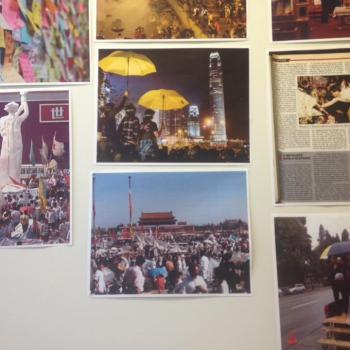June 4 is a day for remembering. This year is no different, for it is now the twenty-fourth anniversary of the Tiananmen Incident, the event in which students who had occupied Tiananmen Square in Beijing for over a month were brutally suppressed–the official term of protest from its observers is massacred–as they demonstrated for a new democratic regime in China.
It is thus a day to remember.
We remember that the fight for redress is not yet over. When a state uses military force against its own citizens and then attempts to paste over these events by denying their historical validity and diverting focus from them onto market reform, it is incumbent on all of us to remember that justice has not yet been served, that the state’s murder of people within its own borders is never just wherever it happens, whether in China in 1989, in the present in Tunisia, Egypt, Libya, Israel/Palestine, Syria, or Turkey, or even in the history of the Americas in American and Canadian treatment of indigenous peoples. We remember because we are calling for the state to acknowledge its own crimes and to bring to justice those who maneuvered the state to commit these crimes.
But we remember also that our memory can be corrupted. We also remember that the remembrance that these atrocities happened have also been used in the service of othering exclusion. We must remember then that when memory becomes corrupted, it can be used for the service of greater evil.
And thus we must also remember that China is not a geographical foil for the politics of life. We have heard over and over of the issues of life in various sites in China–a little girl run over by a truck, the countless road accidents, the melamine lacing of baby powder, the unethical production of under-regulated automobile parts, the human rights abuses against ethnic minorities. Recently, we heard of a baby boy flushed down a toilet by a desperate mother, and we heard of school principals sexually preying on their own students in collusion with government officials. As we hear of these issues, we are tempted to frame China as the space of the other, a space where life is devalued, a space inhabited by barbarians and country bumpkins and industrial crooks and political Fu Manchu masterminds, a space where everything should point to the events of Tiananmen being just business as usual.
Even as we remember for the sake of Tiananmen redress, we also remember that we must not give in to the temptation to see China as a unified geopolitical bloc. We remember instead that China is vast, that its political system is complex, and that its vastness and complexity belies many avenues of dissent. We remember that dissent is not always on the side of justice simply because it is dissent, that people we hold up as democracy heroes like Nobel Prize winner Liu Xiaobo supported the Bush Administration’s Iraq War with the anti-democratic, neoconservative rationale of pre-emptive warfare in the hope of forcibly enacting democracy in the Middle East for American imperialist interests. We remember that China is not the unitary other, that people and politics as complex as our own go on there as well, and that our pleas for redress are coupled with the complexities of human sociality.
We thus do not remember in order to frame China as the geopolitical other. We remember instead that history is littered with spectacles of violence as various individuals, parties, regimes, and imperial rulers have attempted to exert their sovereign power to make the meaning of ‘Chineseness’ uniform. We remember that these efforts at racial, ethnic, and national subjectification are themselves born of unjust impulses. For what, after all, was the point of the crackdown at Tiananmen, if not to exert the sovereign power of the state to make an international example of those who dared to dissent against an ideology of Chineseness?
So yes, we protest as we remember. But how we protest can never be done with the methods of exclusion. As John Paul II reminded us in Centesimus annus, our protest is not waged by deploying alternate ideologies as foils to injustice. Instead, a constant focus on the dignity of the human person is a protest against ideology itself, grounding our critique in the reality that we are not primarily cogs in a state or market regime, but embodied persons who live and eat and sleep and feel and play and work and laugh and weep and love. Yes, we remember, but our memory grapples with the will to power inherent in something as banal as saying that all ‘Chinese’ people should be a certain way. Those of us who are Christians who join in this protest are thus uninterested in developing a new ideology of what it means to be Chinese. We are looking forward instead to the day when our human community will be constituted by the recognition that we are all made in the image of God.










